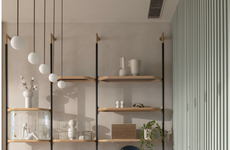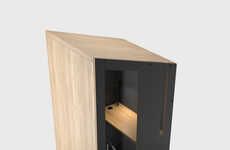
This Mental Health Campaign Aims to Change Solitary Confinement
Katherine Pendrill — October 15, 2015 — Art & Design
References: ted & magazine.good.is
University of Utah biologist Nalini Nadkarni recently came up with an innovative way to change solitary confinement. For prisoners who are condemned to solitary confinement, 23 hours of the day is spent in solitude. The experience causes many prisoners to become discouraged and act out.
Nadkarni's came up with a way to change solitary confinement by drawing on the idea of nature rehabilitation. Nadkarni designed a 'Blue Room' that is equipped with a projector. The projector plays loops of National Geographic documentaries as well as nature sounds such as crashing waves and gentle winds. The idea behind the room is to provide a tool for diffusing volatile situations. Initial research shows that inmates feel more calm and less anxious after spending time in the Blue Room.
Nadkarni's unique prison cell could help to change the way that prisons use solitary confinement.
Nadkarni's came up with a way to change solitary confinement by drawing on the idea of nature rehabilitation. Nadkarni designed a 'Blue Room' that is equipped with a projector. The projector plays loops of National Geographic documentaries as well as nature sounds such as crashing waves and gentle winds. The idea behind the room is to provide a tool for diffusing volatile situations. Initial research shows that inmates feel more calm and less anxious after spending time in the Blue Room.
Nadkarni's unique prison cell could help to change the way that prisons use solitary confinement.
Trend Themes
1. Nature Rehabilitation - Exploring the use of nature-inspired environments and elements to promote well-being and reduce anxiety in various settings, including prisons.
2. Sensory Stimulation - Integrating audiovisual elements, such as nature sounds and visual projections, to create immersive experiences for therapeutic purposes.
3. Alternative Confinement Approaches - Exploring innovative methods that aim to change the negative effects of solitary confinement by incorporating more humane and mentally stimulating environments.
Industry Implications
1. Prison Systems - Implementing nature-inspired rehabilitation programs as a potential disruptive innovation to improve inmate well-being and decrease recidivism rates.
2. Mental Health Services - Integrating sensory stimulation techniques into therapy sessions and treatment programs to alleviate anxiety and enhance mental well-being for individuals in various care settings.
3. Psychology Research - Investigating the impact of alternative confinement approaches, such as the 'Blue Room,' on psychological states, behavior, and potential applications in other areas of mental health and rehabilitation.
2.2
Score
Popularity
Activity
Freshness























